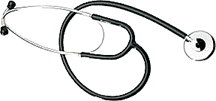

C O M M E N T A R Y
Obesity and Fen-phen: The temptation was, and is, too great(For new developments regarding these agents, please see "In the News")
Obesity is a major health problem in developed countries, which by the way are the same countries whose people have the resources to access the Internet. It is estimated that there are 76 million obese people in the United States. This amounts to about 33% of the population (up from about 25% in the 1960's). Health risks are related primarily to the cardiovascular system, with obesity being linked significantly to high blood pressure, high cholesterol, stroke, and heart attack. It has been labeled the second-leading cause of preventable death (next to smoking) in the US, contributing to 300,000 deaths. This then is a public health issue, comparable in scope to an epidemic.
Coupled with this is the great importance placed on appearance in our society. Overweight, perhaps even "normal weight", is considered to be very unattractive. Patients' vanity may make them highly motivated, but they still often remain unable to lose weight. Physicians are motivated to help their patients lose weight to minimize the impact of obesity on their health. Many diets, plans, herbs, and drugs have been introduced to help in this common endeavor, none as potent or successful as "fen-phen" (a combination of fenfluramine and phentermine) or dexfenfluramine (marketed as "Redux"). Initial experience with these drugs, which increase serotonin in the brain to produce a feeling of already being full, were very positive. Patients did eat less, and did lose weight easily. A sense of control over eating often was produced which allowed patients to continue to maintain better eating habits while off of the medications.
Put all of this motivation together, and you get a bonanza in sales: 18 million prescriptions for the diet drugs known as fen-phen were filled in 1996 alone.
There were several concerns present from the beginning. There was a suspicion that these agents might repeat the European experience with another diet agent (aminorex) used in the 60's and 70's which was associated with "Primary Pulmonary Hypertension" (PPH) (PPH is much less common, and totally different from "systemic hypertension" for which so many people are treated in this country -- in PPH, there is thickening of the muscles in the blood vessels to the arteries to the lungs with progressive increases in the pressure which can be untreatable and fatal). The European experience with Fen-phen and Redux indicated that the risk of Pulmonary Hypertension was about 30 cases in 1,000,000. Recently, further problems related to valvular heart disease have been noted, and the combination and redux have been withdrawn from the market by their manufacturers. In The News
What is the lesson in all of this? I think it depends on your point of view.
The problem with obesity is that it has a continued identity crisis. Is it a disease? A bad habit? A genetic variation? Should it be treated with behavior modification? Pills? It is clearly different things to different people. I would submit the reason that many find the fen-phen episode "tragic" is because they don't consider obesity a disease, and therefore the risks of treatment are felt to be high.
Consider person A: they have Progressive Ambulatory Disinguinal Dysfunction (PADD), an (imaginary) disease that leads to progressive decline in functional abilities. Studies have shown that people with this disorder die an average of 12.5 years earlier than the remaining population. Prigalactospud is an (imaginary) potent agent which reduces the effects of PADD and is hoped to provide a normal lifespan. 2 people in a trial of 100,000 patients who took Prigalactospud developed a rare, fatal and incurable disease that leads to death within 3 years. Person A has tried all of the other remedies for PADD. Should he try this new agent? Now I'm serious here . . . imagine you have this disorder. Would you take Prigalactospud? I submit that most people would. It is hard to think that you will pass by a 499,999 to 1 chance that you will have an improvement that will lead to a prolonged life.
Consider person B: They have bad, ugly hair. They could have beautiful hair, but they don't want to take the time to wash it or comb it. They want to take Makeumnice, a pill that will make their hair nicer without all of the work. There is a 1 in 500,000 chance of developing a fatal disease. Wouldn't it be a tragedy if these people develop this disease?
Person A took a chance on improving their survival. Person B let vanity and laziness take them to their doom. Which happened with Fen-phen and Redux? This is where it depends on your point of view, or who you were.
To my way of thinking, these diet agents were reasonable medications -- medications whose risks, while significant and dangerous, were infrequent. The potential benefits were far greater -- a person had a greater chance of living by taking the drugs. Discontinuing the distribution of the medications is legally and medically sound, since the incidence of valvular disease, unlike PPH, is unknown at this time. Three issues remain important, however.
- Weight loss was not sustained in a majority of cases, and a survival benefit, while possible, was never proven. The lack of proof of survival benefit is not unusual in drugs which have been recently released. Until there is such proof, caution should be exercised in the use of the drugs, caution which was abandoned by some who prescribed the agents.
- while both fenfluramine and phentermine were individually studied and approved by the FDA, the combination was not subjected to intense scrutiny by the FDA. The problem of combination use and lack of testing will continue to remain.
- While the agents were of substantial value for the seriously obese where the risk-to-benefit ratio was likely to be high, the agents were far too often given for cosmetic, as opposed to medically necessary, weight loss.
Fen-phen and Redux were not a bad idea -- they were potential solutions for a major health problem. Unfortunately, the demand from the public led to unwarranted over prescription in some cases, cases which may now be viewed to be tragic in light of the appearance of an unsuspected side effect. This should give us pause when we consider the next drugs for obesity, and should lead to even greater concern when we consider making any such drugs, even the so-called "natural fen-phens", available over-the-counter. The temptation was just too great.
Updated October 29, 1997
We hope you enjoy HeartPoint, and that it is of interest and benefit to you.
We'd like to hear from you. Please forward any comments or suggestions you may have. (Contact Us)
Darrell J. Youngman, D.O.
June 1997ęCOPY;1997 HeartPoint

![]()
![]()
| Food You Will Love
| HeartPoint Gallery | In The News | Health Tips
|
| Information Center | Commentary Archives | Home
|
This site presents material for your information, education and entertainment. We can assume no liability for inaccuracies, errors, or omissions. Above all, material on this site should not take the place of the care you receive from a personal physician. It is simply designed to help in the understanding of the heart and heart disease, and not as a diagnostic or therapeutic aid. You should seek prompt medical care for any specific health issues. Please feel free to browse the site and download material for personal and non-commercial use. You may not however distribute, modify, transmit or reuse any of these materials for public or commercial use. You should assume that all contents of the site are copyrighted. ęCOPY;1997 HeartPoint